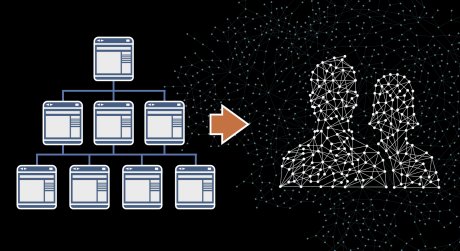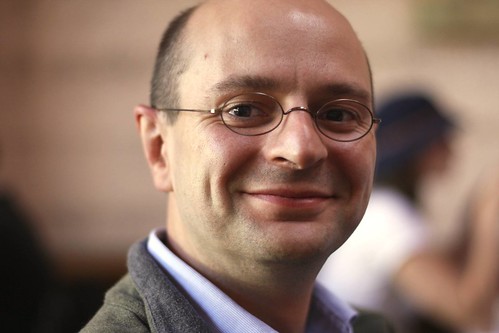Facebook's head of mobile business, Henri Moissinac, gave some tantalising insights into the firm's mobile aspirations when I interviewed him at the Planet of the Apps conference in London yesterday.
At one point he described Facebook's very telling vision of the direction of consumer web behaviour, saying that "people used to search the web but now browse the graph" – the Facebook social graph. That's not to overlook the power of search, but indicates how aggressively Facebook is positioning itself at the heart of the internet, as the starting point for the consumer online experience.
 Henri Moissinac's presentation explained how Facebook sees the web moving from search to social
Henri Moissinac's presentation explained how Facebook sees the web moving from search to social
666 million users: It's four months since Facebook announced that it had reached 500 million active monthly users worldwide, 26 million of whom are in the UK. Those numbers have undoubtedly increased; mobile has risen from 150 million active monthly users in July to 200 million as announced by founder Mark Zuckerberg last night. It's fair to assume, then, that with a similar rate of growth the global user number is now around the deliciously symbolic 666 million.
Facebook Zero: Facebook watchers have noted that the company's relatively effortless rise to half a billion users will be much harder to repeat for the next half a billion, with developing markets crucial to that growth. Mobile is key to that, particularly in markets where desktop use is low, such as Africa. Facebook's response to this strategy is Facebook Zero, a simplified, image-free version of the site that users can access for free in some of the markets where Facebook has negotiated a deal with operators. Turkey is seeing strong growth of Facebook Zero because mobile data costs are so high, and is just one country where users are benefitting from Facebook's deals with 300 mobile operators.

Henri Moissinac, Facebook's head of mobile business. Photo by rsepulveda on Flickr. Some rights reserved.
Future: Moissinac described two different futures for Facebook; one in the developing world and one in the developed world. Facebook Zero gives some insight into how the company plans to pursue mobile-orientated growth across the former.
Developers: Moissinac described third-party developers' objectives as a combination of distribution, audience engagement and monetisation. Facebook has not done enough so far to help developers make money from their apps on Facebook, he admitted, but is planning to work on that.
When asked about Facebook's own monetisation plans he insisted it is still very early days, but eMarketer has estimated Facebook's ad revenue for 2010 will be around $1.28bn world – up from $665m in 2009.
More stats from Moissinac:
• 50% of Facebook users come back every day
• 500,000 apps on Facebook
• 250 million users every day
• Mobile use is surprisingly 60% through mobile browsers, rather than apps, though 15% is through SMS.
• Most active mobile users are in Indonesia, South Africa, Kenya, Canada and the US, where at least 60% of Facebook users spend just as much time on a mobile device as on the desktop.
• Look at our data on Three mobile broadband use as one indicator, borne out by Nielsen data on US average time spent online from September this year; Facebook at 5 hours 25 minutes compared to Yahoo at 2:17 and YouTube at 1:17.
Startup culture: What Moissinac also described – when repeatedly asked by the audience for release dates for an iPad app and various other projects – is how relatively small Facebook still is. It's a risky habit to give fixed release dates for developer projects which can easily slip back. Plus, despite the enormous expectation and scrutiny of its products and activity, and the now phenomenal reach of its service, it is still a small company of just 2,000 staff (that's was Moissinac's guess, though LinkedIn says more like 3,000).
That ever-attractive "newness" would explain the influx of staff inspired to leave the now goliath Google to join Facebook, on 1601 California Avenue.
